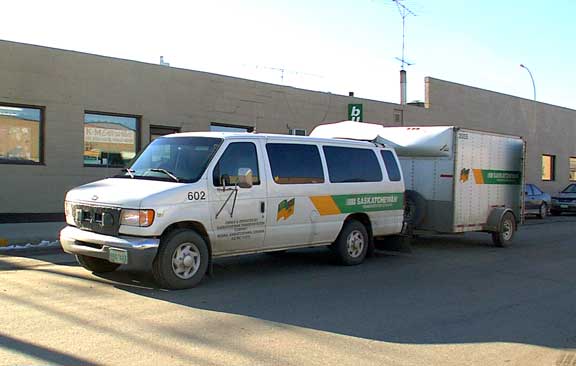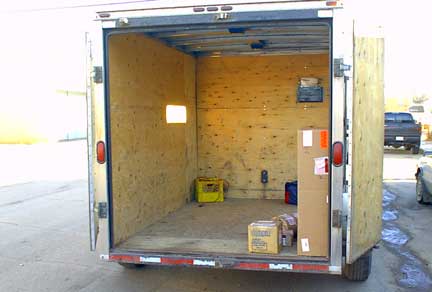 |
|
The People's Bus Company |
| FTLComm - Tisdale - Friday, November 9, 2001 |
| There is no question that the provincial government operating what in many other
parts of the world are within the realm of the private sector has puzzled economists
and political thinkers alike. With the desperation that came and was the legacy
of the great depression, the "dirty-thirties" Saskatchewan and its people
were determined to provide for each other and perhaps be prepared to cope with the
harsh realities of living in a place where profit and survival are sometimes indistinguishable
from one another. It is pretty widely recognised that much of what we know of as the way things are done in Saskatchewan is attributed to the Weyburn preacher who became premier and went on to deliver Medicare to the whole of the nation. Tommy Douglas is the many both credited with and condemned as the person responsible for "socialising" Saskatchewan. Of course as in all legends some of it is true but there are always other factors and the depression was the main creator of Saskatchewan's dependence on publicly established services and companies. In the United States where the political and economic climate was so much different the dirty-thirties simply cause the huge population of Oklahoma to disappear. In Saskatchewan with the same circumstances, certainly there was some tragic depopulation conditions South of Regina but the province also experience a remarkable opening up of the parkland region as poor folks headed off into the woods, further defusing the population and making it even more difficult for the people of the province to have the services we associate with civilisation. One other extremely important factor and one that is so often ignored is that Tommy Douglas, though a brilliant orator was hardly a man acting alone. He had a large number of capable people who supported him and in many cases provide their brilliant mouthpiece with the ideas and concepts that his charisma and oratory could propel forward. In 1952 we moved to Langbank from Kelso. Across the street from us in Langbank was a little building owned an operated by Jack Hurst. From that building on the poles around the village ran the wires that carried electricity to us all but only a mile away the farms depended on Coleman lanterns and a few had wind electric generators. But within that decade SaskPower provided electricity to the whole province. Rural telephone companies were all over the place, some were co-operatives, some private but SaskTel was created to get everyone a telephone. The approach of fairness and universal access is as fundamental as air and sunlight to Saskatchewan people and through the years, the decades and in four years from now, a century, Saskatchewan people have been doing things as a government for each other with fairness and equality in mind.  A few private bus lines developed, Moose Mountain and Biggar but for most of Saskatchewan that was not on the TransCanada highway, served by GreyHound Saskatchewan people relied upon the people's bus lines. Saskatchewan Transportation Company. Each decade there are discussions about the viability and necessity of this service which like all public transportation systems is always just breaking even or running a little in the red. STC has been just another example of the desire Saskatchewan people have to treat each other, where ever they live, fairly and make sure they have access to the needs of their community and of each individual STC has found it tough and in the past eight years has been trying various strategies to continue to provide service while do the same work, but doing it more cost effectively. They have tried two strategies, replacing the huge and very costly coaches with smaller buses built on van chassis and by using vans themselves like this one with a freight trailer on routes where the passenger loads are small but steady. Passengers do not pay for the cost of operating the service but freight provides a steady flow of income. By using smaller equipment like this and the pickup trucks with freight trailers they are able to reduce their per unit of distance traveled by two thirds. For people who don't know about the 1930s SaskTel, SGI, SaskPower, SaskEnergy, STC may all look just like some socialist plot. But for those of us who have grown up here we know that these publicly own businesses, our Crown Corporations have been necessary to even out distance and make this vast province livable. There are some unwritten rules about Crown corporations that everyone should understand. Primarily they have been created because the service they provide is crucial to the survival of the rural population. Secondly, the Crowns are not intended to compete with private business but rather to facilitate service. Where ever services can be provided by private business at a fair and competitive cost to the public then there is no need for public corporations to do the same service. However, fairness and universality is the abiding principle behind the use of public corporations to provide the rural public with services that they need. Public corporations are not a political thing they must always be an issue of fairness and service. Private business can only function in a climate where there are reasonable expectations of making a profit. All of Saskatchewan's crown corporations were born out of conditions where no private business could have reasonably be expected to generate income. The best example is Canada's airline industry that is in such dire straits with Canada 3000 going broke yesterday. The Canadian airline industry may not be viable as a private industry. Air Canada was originally begun, just ad the Canadian National Railway was begun because each of these businesses were not deemed to be economically viable. The political ideology of the Mulroney government seen Air Canada moved to a private business and we are about to see it go broke as a result. Fortunately the people of Saskatchewan still care about each other enough to keep the STC on the road. |